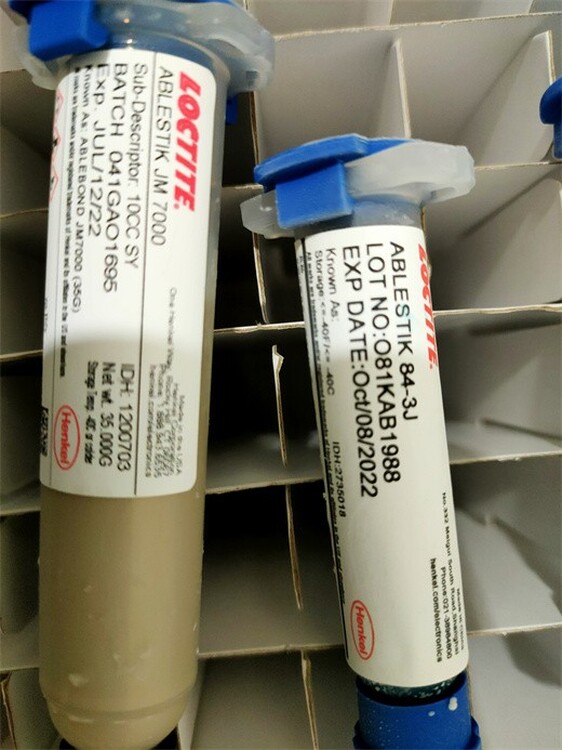泰安厚膜汉高ABLESTIKJM7000导电胶,JM7000导电胶
-
面议
TYPICAL PROPERTIES OF UNCURED MATERIAL
Viscosity, HAAKE RV-20 Rotoviscometer, mPa·s (cP):
Cone 1º @ Shear rate 22 s
-1 9,000
Work Life @ 25°C, hours 8 to 16
Shelf Life @ -40°C (from date of manufacture), days 365
TYPICAL CURING PERFORMANCE
Cure Schedule
30 minutes @ 150°C
Suggested temperature cures are from 150 to 350ºC. For
applications requiring higher electrical conductivity, a cure cycle of 15
minutes @ 300ºC is recommended. Product properties will not be
reduced by subsequent post die attach thermal exposure, i.e.,
wirebond, and/or lid seal up to 370ºC.
TYPICAL PROPERTIES OF CURED MATERIAL
Physical Properties
Coefficient of Thermal Expansion, :
Below Tg, ppm/°C 33
Glass Transition Temperature (Tg) by TMA, °C 240
Bulk Thermal Conductivity, W/(m-K):
@ 90°C 1.1
@ 165°C 1.0
Tensile Modulus, DMTA :
Cured 30 minutes @ 300ºC N/mm² 10,000
(psi) (1,450,377)
Extractable Ionic Content, @ 100°C:
Chloride (Cl-) <10
Sodium (Na+) <15
Potassium (K+) <15
Decomposition (in N2):
TGA analysis @ 10ºC/ minute ramp from 25 to 400
ºC
@ 340ºC, % 0.2
@ 400ºC, % 0.3
Electrical Properties
Sample cured 30 minutes @ 300ºC
Volume Resistivity, ohm-cm ≤0.01
TYPICAL PERFORMANCE OF CURED MATERIAL
Die Shear Strength:
2 X 2 mm Si die, kg-f,
cured 20 minutes @ 150ºC
Substrate DSS
Ag/Cu LF ≥5
Tensile Strength :
cured 30 minutes @ 300ºC, MPa
After Cure After 1000 TC'C"
>17 >17
Radius of Curvature:
Si die on Alumina, meters
cured 30 minutes @ 300ºC
Chip Size: ROC
15 x 15 mm > 5